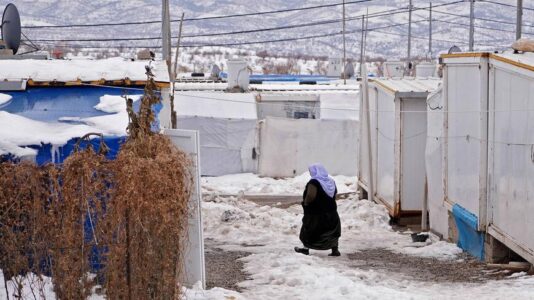
Yazidis react to the killing of Islamic State leader
The death of Islamic State (IS) leader Abu Ibrahim al-Hashimi al-Qurayshi, also known as Abdullah Qaradash, in Syria’s northwest province of Idlib on Feb. 3 sparked various reactions among Yazidis, against whom IS committed war crimes and atrocities since it occupied their historic homeland in Iraq in August 2014.
Seif Mito, a 19-year-old Yazidi, told Al-Monitor how he suffered at the hands of IS during its rule. He said IS fighters kidnapped him from Sinjar in northern Iraq, along with his brother Zeid, who is five years younger than him, after his entire family was killed.
Commenting on Qurayshi’s role in the genocide against the Yazidis, Mito said, “After the soldiers of the caliphate captured us, they moved us — there were hundreds of Yazidi boys and girls — to the technical institute in Solagh, east of Sinjar, on Aug. 15, 2014. Then, Qurayshi arrived with some IS figures in a Toyota Prado, and told us that we will be the next generation of the caliphate and the soldiers of their Islamic state. He then gave the Yazidi girls to his soldiers as sex slaves, and chose young Yazidi girls as sex slaves for himself. I recognized three of the girls, including a neighbor of mine. Then they moved us to Raqqa in Syria.”
He said IS sent them to the so-called Cubs of the Caliphate camps in Raqqa — IS’ former self-proclaimed capital in Syra — where they trained him and his brother, along with hundreds of other Yazidi children, in the use of firearms, and forced them to fight within IS’ ranks on the frontlines.
Mito said he wished the US forces who led the operation in Idlib Feb. 3 had arrested Qurayshi, so he could have been tried in Sinjar in the presence of the Yazidi victims.
Raghda, an 18-year-old Yazidi survivor who refused to reveal her full name, expressed joy at the killing of Qurayshi, who used her as his sex slave when she was only 12 years old in the city of Raqqa. She told Al-Monitor, “I wish Qurayshi was arrested so that we could learn from him about the fate of the missing Yazidis, what happened to them and where they were taken after the fall of IS. My sister and cousin were kidnapped when they were very young. We still know nothing about them.”
She described Qurayshi as authoritarian, oppressive and fundamentalist who held in captivity dozens of Yazidi women that he raped and abused.
US President Joe Biden said during a press conference Feb. 3 that US counterterrorism forces carried out a “successful” special operation in the Syrian border town of Atmeh, targeting Qurayshi, who blew up himself and his family during the US forces raid, killing at least nine people, including two children and a woman.
Sources who spoke to Al-Arabiya said that three women were killed in the raid and they are believed to be Qurayshi’s wives.
Speaking to Al-Monitor on condition of anonymity for security reasons, a source from Idlib city said that one of the three women was a Yazidi from Iraq, whom Qurayshi had taken as a sex slave for himself, and he had brought her with him after kidnapping her from Sinjar.
The source said that after the downfall of Baghouz at the hands of the Syrian Democratic Forces (SDF) in 2019, many IS leaders and fighters fled Baghouz to the Turkish-controlled areas in Syria, and took with them Yazidi women that IS had kidnapped from Sinjar in 2014.
Press reports revealed that Qurayshi supervised the kidnapping of Yazidis and killing of the Yazidi minority in northwest Iraq.
Ahmed al-Dulaimi, Iraqi researcher focusing on terrorist groups’ affairs, told Al-Monitor that Qurayshi was the one who planned and supervised the massacres IS committed against the Yazidis, most notably in the village of Kojo in 2014.
He said that according to statistics, 2,000-5,000 Yazidis were killed at the hands of IS in Sinjar, the largest number of victims being in Kojo village where nearly 500 people were killed by IS.
Speaking to Al-Monitor, Kulbahar, a young Yazidi woman from Kojo, recounted how IS figures entered the village of Kojo and killed hundreds of men, including her father, three brothers and uncle. They then took her, along with her mother and sister, to Mosul and then to Raqqa, where IS sold them dozens of times before they were set free by the SDF in 2017.
She called for the arrest of all IS leaders and for bringing them to justice. She said, “I was pleased to learn about the killing of Qurayshi. I hope that the US forces arrest all IS jihadis who fled after the collapse of their state and give them a just punishment.”
Kulbahar added, “IS cells continue to hide among civilians in Syria and Iraq, and they still detain many Yazidis. Even in al-Hol camp in Hasakah, IS families are still enslaving Yazidis — many of whom are afraid to reveal who they are in the camp for fear of being killed by IS women.”
Source: Al Monitor





